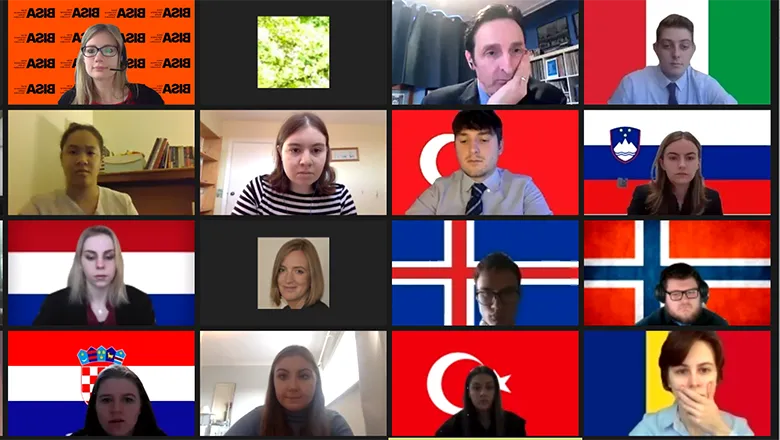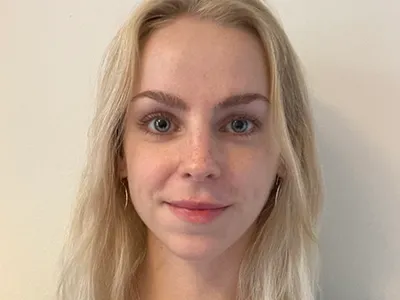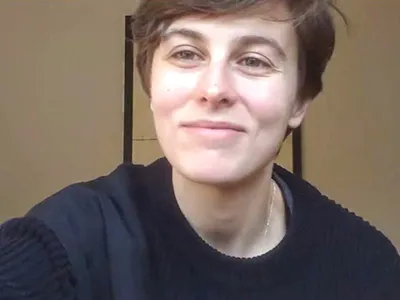What I found most exciting about the experience was getting to represent a country and ‘be diplomats’ for a day – responding to a crisis of such major scale. Learning about how NATO works in such an immersive way taught me so much more than just reading about it!
Megan Neill Andrés
04 February 2021
War Studies students become 'diplomats' for a day as part of Model NATO
Students from War Studies gained invaluable insight and experience of NATO participating in a simulation of the Alliance responding to a major crisis.

Four students from the Department of War Studies represented King’s College London last week at this year’s BISA Model NATO – a simulation of the Alliance responding to a global crisis.
Run by the British International Studies Association (BISA) in partnership with the Foreign Commonwealth ad Development Office (FCDO) and NATO’s Public Diplomacy Division, this annual event brings together students from 15 universities across the UK to learn more about how NATO works by actively taking part in a mock council.
The day was kicked off by a welcome from NATO Assistant General Secretary Baiba Braze. The Model then commenced with students participating in several sessions of NATO’s North Atlantic Council, with students representing members of the Alliance, responding to a series of major seismic events – earthquakes, volcanic eruptions and tidal surges – in the Mediterranean and Atlantic.
The two teams from War Studies represented Romania and the Netherlands, and were tasked with undertaking research prior to the event on their country’s position, paying particular attention to national assets both military and civilian which might contribute to a NATO crisis-response operation.

Alice Learmouth, MA in National Security Studies, who represented the Netherlands shares her experience:
“Model NATO was an invaluable experience which granted me insight into how the multilateral organisation might respond to a crisis.
Challenges and experiences
“The day was incredibly fast-paced, moving from general debate to unmoderated caucuses to drafting texts to voting, all whilst consistently private messaging other countries to negotiate proposals. This multi-tasking was a definite challenge, but incredibly stimulating and indeed successful, since all countries were able to reach a consensus at the end of the day.
“Writing concise, clear texts under time pressure that other countries were likely to back was another challenge. Luckily the proposals and amendments we put forward were successfully passed, which was very rewarding.
Skills and knowledge gained
“I thoroughly enjoyed teaming up with our allies on certain issues and thinking on the spot about what might be in the Netherlands' best interests. Preparing for the model additionally allowed me to gain an in-depth knowledge of NATO's different capabilities and role in crisis management.
"We were also able to hear from Peter Rickard, a representative of the UK delegation to NATO, and benefit from his expertise and insights of how negotiations really work.
"Overall, it was an incredible day and despite being virtual this year I gained so much out of it that I hope to take into my future career.”

Megan Neill Andrés, MA in National Security Studies, who represented Romania shares her experience:
“What I found most exciting about the experience was getting to represent a country and ‘be diplomats’ for a day – responding to a crisis of such major scale. Learning about how NATO works in such an immersive way taught me so much more than just reading about it!
Skills and knowledge gained
"The day taught me a lot about the internal workings of NATO and I learned to balance military-security, political and social issues facing the Alliance, the importance of priority-setting and the patterns of cooperation and conflict raised by these issues. What struck me the most was how the model demonstrated the need for collaborative action in the most challenging times, when cooperation is often difficult.
Challenges and experiences
“As I’d never participated in anything like this before, the most challenging thing was preparing for it not really knowing what to expect. But thanks to the model, I gained some really good experience and skills related to the world of diplomacy.
“While I was a bit shy and confused at the beginning, I overcame this by the second session. The experience helped me develop my communication skills as well as my confidence, and of course, teamwork and negotiation skills. I've realised how important it is to be outgoing and hold your ground, while, at the same time, viewing things from the perspective of others and negotiating to reach consensus.”
How my degree helped
"My MA in National Security Studies was perfect for preparing me for this experience, while my BA in War Studies and History provided me with a wider basis of International Relations that was definitely helpful to understand the dynamics of international politics and debate.
“The MA is very focused on the practical issues of policymaking. As such, it has helped me develop practical, policy-oriented insights and improved my strategic analysis and policy development skills.
“Thanks to this, I was able to see ‘the bigger picture’ and think in short-, medium- and long-term issues - not focusing only on the immediate response to the crisis, but also in reconstruction efforts and the impact of COVID-19, for example.”
